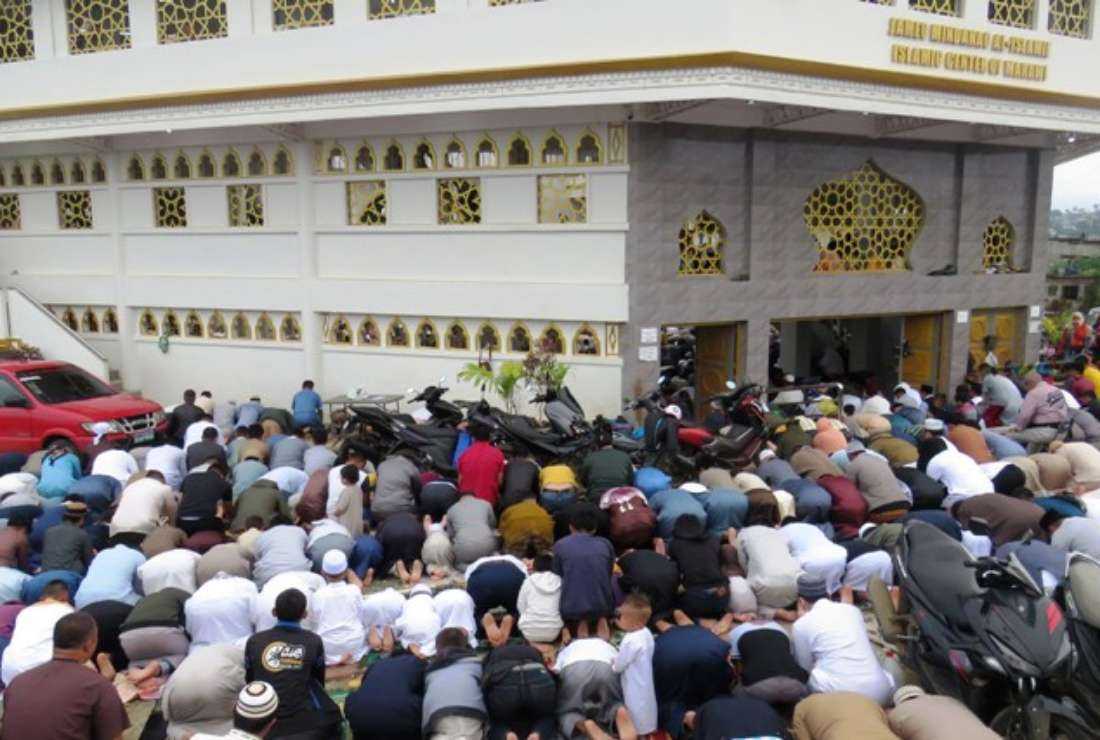
Filipino Muslims pray at a mosque during Eid al-Fitr, marking the end of the holy fasting month of Ramadan, in Marawi City, on the southern island of Mindanao on May 2. (Photo: Merlyn Manos / AFP)
Filipino lawmakers led by a Muslim senator on Aug. 17 passed a bill seeking to criminalize discrimination which includes profiling and refusing employment based on religion or race.
Muslim convert Senator Robin Padilla claimed that those from religious minorities like him suffered discrimination in the workplace because of their creed.
“I did not feel the discrimination when I was still a Catholic. We are a Catholic nation so being one is the norm. But when I became a Muslim, then I became the exception. Things have changed, especially in the workplace when I began to work with fellow actors who were Christians,” Padilla told reporters on Aug. 18.
The country needs a law to equalize the playing field between Christians and non-Christians, he said, by imposing sanctions on those who discriminate based on creed and race.
“We need to protect the rights of all Filipinos by having a law that protects all Filipinos from discrimination. If a person is found guilty, he or she will be penalized with a jail term of at least six years and a fine of at least 100,000 pesos [US$2,000],” Padilla added.
He said punishment cannot be the only solution and there is also a need to educate the young.
The bill aims to address racial discrimination in the workplace by providing seminars and talks on the topic, as well as mandatory lectures on Philippine history and culture.
“Education is the key. The root cause of discrimination is ignorance. If we educate the mind, positive things would surely happen,” Muslim leader Rasheed Wahab Jaafar told UCA News.
Meanwhile, Lumad leader Prospero Kalusig said the bill would not only protect Muslims but indigenous peoples who also yearn for equal portrayal with the Catholic majority.
“Many Catholics still believe that if one belongs to an indigenous tribe, the person worships nature or he or she does not have any formal religion or creed. But doesn’t the Philippine Constitution guarantee freedom of religion free from any restraint?” Kalusig asked UCA News.
Philippine authorities estimate that of the total population of 110 million, over 79 percent are Roman Catholic while 9 percent belong to other Christian groups.
Muslims comprise around 5 percent of the total population.
Muslims are not well-represented or even represented at all in the national consciousness from politics to entertainment, including but not limited to the education sector, the National Commission on Muslim Filipinos said in a 2021 report.
“Even worse, when Muslims are depicted at all in popular media, these materials present them as the ‘other’ and feature long-held (and false) stereotypes, such as deceitfulness and violence,” it added.
“A similar trend may be observed in news reports or even in movies: Crime-related headlines involving Muslim suspects also needlessly include the adjective ‘Muslim’.”
In one of its provisions, the bill sought positive Islam representation to overcome the negative Muslim stereotypes.
“In this bill, even teachers and parents could be held liable if they are not careful of their comments and standards of evaluation not only of Muslims but those who belong to other religious sects,” Padilla added.
The Catholic Bishops’ Conference on Indigenous Peoples said racial and ethnic discrimination has colonial and historical underpinnings.
“Religious and racial discrimination did not arise from nowhere. They are the products of our country’s historical and colonial experience, which, from the start, was motivated by a ‘divide and rule’ mindset: encouraging Christian Filipinos to fight against Muslims developed feelings of distrust between these two groups,” the commission’s executive secretary August Abuso said in an online statement.
In 2014, Philippine bishops welcomed the enactment of the Bangsamoro Organic Law which provided the basic structure of government for Muslim provinces in Mindanao.
“The effort the government has taken to arrive at an agreement acceptable to all Filipinos underscores the premium that must be placed on the political and territorial integrity of the entire country. History — guided by The Lord of History — has fashioned our nation as one. Let us keep it one — in that variety of ethnicities, cultures, languages and peoples that makes it one of the most alluring pieces of Divine workmanship in the world,” said the prelates in their pastoral letter.


